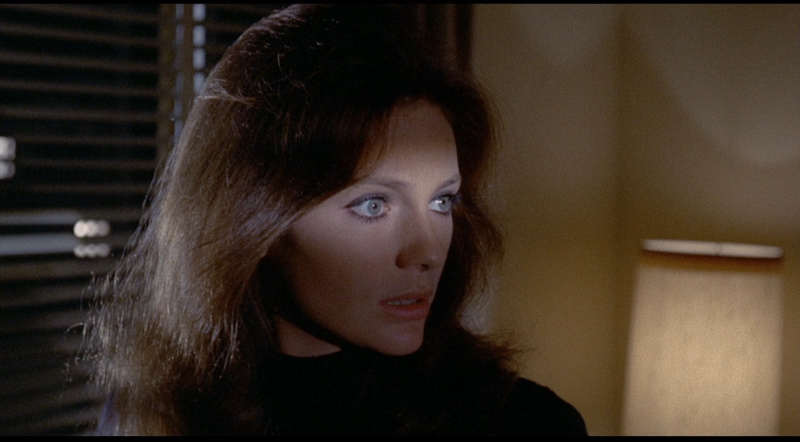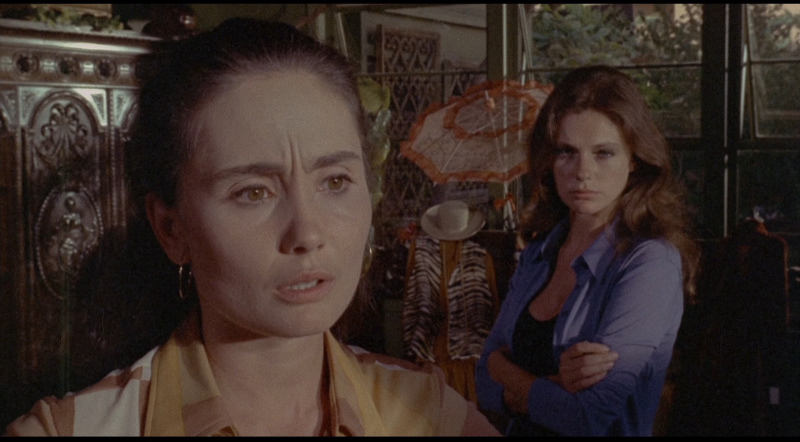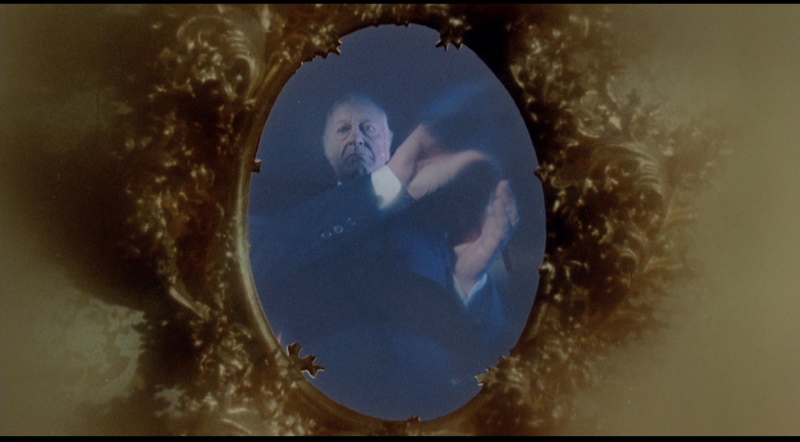I don’t know…maybe Satanism is the way to go. I mean, it’s not like there’s anything on TV. And Jesus palomino is it ever hot this summer. If I gotta dance around a dead tree in the buff, wearing a goat head, just to head off streaming boredom and the searing heat, well…. Wait, I got a better idea: why don’t I dig around some of my old Kino Lorber Blu-rays, and see what those charming, sexy people over at that fabulous releasing company, have up their gorgeous sleeves (yes—we grovel for product here). And here’s the ticket: The Mephisto Waltz! Christianity and my modesty—my flower—are both saved!
By Paul Mavis
Kino Lorber, along with 20th Century-Fox, has released on Blu-ray The Mephisto Waltz, the 1971 Satanic occult thriller from Fox and TV producer extraordinaire Quinn Martin, based on author Fred Mustard Stewart’s bestselling paperback, directed by Paul Wendkos, scripted by Ben Maddow, scored (sensationally) by Jerry Goldsmith, and starring Alan Alda, Jacqueline Bisset, Barbara Parkins, Curt Jurgens, Bradford Dillman, William Windom, Kathleen Widdoes, Pamelyn Ferdin, Antoinette Bower, and, um…Tim the dog.
Click to order The Mephisto Waltz on Blu-ray:
An unapologetic, cheapjack knock-off of Rosemary’s Baby, The Mephisto Waltz stiffed in theaters and met with hostile critics, but went on to gain a tiny cult following from infrequent reruns on TV—not too surprising, considering the TV talent behind the lens (the dog with the human head is responsible for about 90% of it). Fans of television’s golden age of made-for-TV movies will be the best fit for this slight-but-watchable outing.

Failed pianist-turned-“musical journalist” Myles Clarkson (Alan Alda) gets the gig of a lifetime for a bottom feeder like himself: an appointment to interview the greatest pianist the world has ever known. No, not Liberace, but Duncan Ely (Curt Jurgens). The imperious Ely is immediately (and improbably) taken with Myles’ hands, and soon he, his slinky, horny daughter Roxanne (Barbara Parkins) and their passel of wastrel Eurotrash friends, descend on Myles and his insanely, impossibly attractive wife, Paula (insanely, impossibly attractive Jacqueline Bisset), intent on making Myles one of their own.

Superficial Myles is all for it, essentially ditching his wife for Duncan and Roxanne, but Paula finds the lot of them distasteful in the extreme, particularly after she sees Duncan making out with his own daughter Roxanne at a wild New Year’s Eve party. Myles thinks Paula’s jealous, but when he’s unwittingly led into giving blood to Duncan, who’s dying of leukemia, Myles suddenly becomes the host body for dead Duncan’s soul, after a surprisingly little amount of Satanic witchery mumbo-jumbo from Roxanne.

Now, the reprobate Duncan lives on in Myles’ body, and frankly, the unaware Paula loves it: lots of money (willed to “Myles” from Duncan’s estate), and lots of forceful, naughty sex that she clearly wasn’t getting from girly Myles. However, when Paula dreams that Duncan fulfills the last part of the Devil’s bargain—the killing of Paula’s and Myles’ daughter, Abby (Pamelyn Ferdin)—followed by Abby’s real demise, Paula finally begins to suspect something is flukey with Myles, confirmed by the suspicious death of instant extramarital boyfriend, Bill DeLancey (Bradford Dillman), the ex-husband of Roxanne.

It’s no big stretch to conclude that The Mephisto Waltz unashamedly apes Rosemary’s Baby’s basic narrative framework…particularly when novelist Fred Mustard Stewart openly stated he was trying to recreate RB author Ira Levin’s successful formula of a young wife unwittingly drawn into witchcraft and Satanism through the backstabbing acts of a weaselly husband. And certainly 20th Century-Fox couldn’t be faulted for doing what every movie studio does: look at what’s a hit with audiences and try and copy it.
RELATED | More 1970s film reviews

Fox was in more financial trouble in 1969, when TV producer Quinn Martin initially brought them The Mephisto Waltz project, than they were in 1971, when it was finally released, but the studio still needed quick-fix titles to stem their cash flow problem. Several people on the Blu-ray commentary tracks here mention Fox’s dire financial problems that supposedly led to acquiring The Mephisto Waltz, without explaining them. Although it’s a convenient start date to point to 1963’s gargantuan production of Cleopatra as the beginning of 20th Century-Fox’s financial troubles, the truth of the matter is the studio (along with all of the other majors at that time) was hemorrhaging money way before tens of millions of dollars were spent baring Liz Taylor’s naked derriere.

People forget that Cleopatra bought in boatloads of money to the studio, which helped keep it just below the waterline, until 1965’s The Sound of Music replenished Fox’s coffers. Unfortunately, instead of addressing the systemic problem behind their continued other losses—outdated material made too costly by studio bloat—the powers-that-be at Fox said, “Let’s just float on huge roadshow musicals!” resulting in tens of millions of dollars of more red ink when Doctor Dolittle, Star!, and Hello, Dolly! failed to make back their nuts, let alone profits.

While Fox had some big b.o. successes during The Mephisto Waltz’s gestation period and release (Butch Cassiday and the Sundance Kid, M*A*S*H, Patton, Planet of the Apes, The French Connection), they just didn’t have enough of them to offset all the pricey dogs like The Chairman, Staircase, John and Mary, The Only Game in Town, The Kremlin Letter, Myra Breckinridge, and Tora! Tora! Tora!—as well as almost everything else that Fox released—that failed. Like The Mephisto Waltz.

So…a cheap occult knock-off of a recent box office hit like Rosemary’s Baby would obviously attract Fox at that time, particularly when they factored in the cost-savings of having proven TV talent behind the camera. There was highly successful producer Quinn Martin of The Fugitive and The FBI fame, making his debut (and final) motion picture for the big screen. Well-respected (i.e.: his movies came in on time and under budget, and usually produced a profit) Paul Wendkos had deftly bounced from movies (Gidget, Hellboats) to TV (Route 66, Honey West), and could be counted on to deliver exactly what he was contracted for by the studio. Unfortunately, it’s all too obvious with The Mephisto Waltz that “TV talent” helped turn a potentially pulpy, punchy theatrical feature into merely a big-screen made-for-TV movie.

Casting and performances are the first signs of trouble. Gorgeous Bisset is fine (she’s always fine); she gives the only decent performance in The Mephisto Waltz, with that tantalizing air she always gives off of a woman both amused and turned-on by her own erotic allure. TV actress Barbara Parkins, however, trying for “perverted” and “smoldering,” instead comes off like she’s concentrating very hard on remembering her next line. It’s yet another failure to capitalize on her adept run in TV’s Peyton Place, and her huge big-screen Fox hit, Valley of the Dolls (no need, really, to comment on Curt Jurgens, a solid thesp-turned-hack who by this point in his career just turned on the watery, hard-boiled eggs eye-staring bit, and called it “acting”).

Broadway and TV actor Alan Alda is The Mephisto Waltz’s biggest drawback (isn’t he that for everything he’s in?). Coming off four big screen box office failures–Paper Lion, The Extraordinary Seaman, Jenny, and The Moonshine War–you can tell he wants to be anywhere but on the set of a cheap, TV-ish horror movie. Smarmily superficial and obnoxious as only Alda can be, he’s perfectly cast as a loser who’s besotted with sudden acceptance by the Satanic jet set (would anyone in their right mind cheat on Bisset?), but woefully, even laughably miscast as a possessed demonic lover that supposedly inspires Bisset to sell her soul just to sleep with him one more time (power and money to rival Ali Baba couldn’t get Phyllis Diller to sleep with Alda, let alone Bissett).

Everything in The Mephisto Waltz screams “bad early 1970s television” (as opposed to “good early 1970s television,” which we review all the time over on Drunk TV), from its unimaginative production design and insistent “talking heads” blocking, to its built-in pauses for commercials and station identifications…and worst of all, its pulled punches in terms of thrills. Since it’s accepted from multiple sources that quite a bit of material was jettisoned by producer Martin from director Wendkos’ first cut, it’s more problematic to finger who is to blame for The Mephisto Waltz’s choppy narrative: scripter (1950s commie writer Ben Maddow), or producer with a pair of scissors.

Stuff just…happens in The Mephisto Waltz, with that TV expositional abruptness and convenience that spells cost-cutting expedience, such as Bisset’s business partner Kathleen Widdoes suddenly remembering out of the blue—as she hilariously looks right at us—that Jurgen’s wife was killed by a dog (thanks for that important plot point, Kathy!). Or a supposedly distraught Bisset suddenly wishing for an affair with stranger Dillman (we don’t even get a hint she’s doing it to pay back cheating Alda—frankly, we don’t know why the hell she’s attempting it).

The most bizarre example is Ferdin’s ghostly character: are we even told at the beginning of the movie that she’s their daughter? She has one short scene at the very beginning of the movie where she answers the phone, referring to her parents by their first names, before she completely disappears—I thought maybe she was a neighbor kid or something until she popped back in 45 minutes later calling Bisset “mommy.” Her death isn’t even shown onscreen (granted, some Ferdin scenes were cut, but according to Ferdin, her death scene was never shot).

How are we supposed to buy Bisset’s grief over her dead daughter—a crucial plot point–when she’s in the movie for all of about 3 minutes? The Mephisto Waltz seems made to have commercial interruptions–not just to sell soap, but to paste over the big jumps in the spotty script (I changed my mind: the dumbest bit is the murder of poor, ill-used-again Dillman: if Alda and the Satanists went to all the trouble of going to Dillman’s beach house…why didn’t they just kill Bisset?).
Regrettably, that network television vibe permeates The Mephisto Waltz, right down to its core, which is fine if you missed last week’s ABC Movie of the Week…but somewhat disappointing if you’re looking for some R-rated Satanic chills and thrills. An incest subplot and some brief, relatively rare Bisset nudity (further proof there’s a God), as well as some relatively common Parkins nudity (she was always getting her kit off), sets The Mephisto Waltz apart from a contemporary MTV, like Spielberg’s Something Evil.

However, a serious lack of violence and gore and just plain scares makes The Mephisto Waltz seem like an Italian giallo with its heart cut out (that R-rating has to come solely from that full-frontal nude woman at the party; otherwise, it’s a hard “GP,” at best). Even the actual witchcraft spookums prove to be woefully prosaic: just a bit of that blue goo, some heebee –jeebee words, and a plaster face mask, and you, too, can switch bodies? That’s how they’re going to freak us out?
All we get are director Wendkos’ overworked rotating camera angles and stolen Roger Corman dream sequences, laced (thankfully) with composer Jerry Goldsmith’s wonderfully evocative, creepy score (along with Bisset, the only element of real note here). Once we know what the deal is—and we sure know quicker than Bisset, since Wendkos shows us Alda’s transformation with desultory directness—The Mephisto Waltz basically becomes a Barnaby Jones episode (“A QM production, with tonight’s special guest star, Satan!”), a murder mystery with a clichéd TV “freeze frame” ending that isn’t particularly ambiguous or mystifying…or worst of all, scary.

I don’t normally do this, but just a quick note about the extras on this bright, sparkling Blu-ray. Extras include two commentary tracks. First, film historian Bill Cooke does a good job of filling us in on the scenes that are missing from The Mephisto Waltz’s first cut…and a lousy job of going off into excruciatingly trivial minutia (who the hell cares how many bedrooms there are in “stately Wayne Manor?”). Way too much info on tangents (the original book and its author) instead of the movie, before Cooke turns performer and does a cringe-worthy reading from Jurgen’s autobiography (I’m genuinely curious how this stuff gets onto a disc. I mean, jumping Jesus Christ, someone call us up at Movies & Drinks: we’ll give you a goddamn commentary track that movie fans will be talking about for years).
Actress Pamelyn Ferdin is on hand for a second audio commentary, moderated by Elijah Drenner, which at least focuses on The Mephisto Waltz, for the most part. Now, full disclosure: I’ve had some previous run-ins with this loon on Facebook (she thinks riding a horse is animal cruelty—so long, Western civilization!). However, I found Ferdin’s description of Hollywood at that point in 1970 (the new pushing out the old, and the resulting tension), as well as the details of her on-set schooling, absolutely fascinating on this track. She was a veteran actor even at that young age, and she was there, so her insights are invaluable (she also has some good reads on what might have been going on behind the scenes of the production). Original trailers for The Mephisto Waltz, Burnt Offerings, Deranged, and Jennifer, round out the extras.
Read more of Paul’s film reviews here. Read Paul’s TV reviews at our sister website, DrunkTV.


